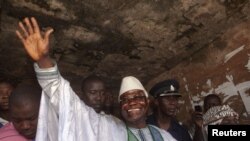Sierra Leone’s government has rejected Transparency International’s latest Global Corruption Barometer report about the West African country.
The TI report said Sierra Leone had the highest incidences of bribery in sub-Saharan Africa.
But Richard Konteh, President Ernest Bai Koroma’s chief of staff, says the TI corruption report demonstrates the anti-graft body’s misunderstanding of Sierra Leone’s cultural practices and norms.
“We turned to believe that the sampling was skewed,” said Konteh. “In our culture, it is normal, if you want to get land from the paramount chief you go with what we call, kola. You give the paramount chief the kola as a sign of respect, that is not bribery. It is also part of our culture to show appreciation to people for good things that they’ve done to you, that is not bribery.”
In its report, Transparency International said 84% of respondents to its poll in Sierra Leone admitted to paying a bribe.
The government disputes the report as not being statistically representative, contending the sample size of 1,028 respondents in a population of about six-million people, the distribution of the sample population, and the sample frame was inadequate.
Konteh says Transparency International failed to take into account measures the Sierra Leone administration continues to implement to combat graft.
“The government has taken tremendous steps in the fight against corruption. The president has outlined he will run a policy of zero tolerance of against corruption. Anybody who is found guilty or indicted in his cabinet, he sacks,” said Konteh. “We have given the Anti-Corruption Commission, the power to prosecute. In the past, before they prosecute they had to go through the attorney general, [but] that is no longer a requirement.”
Konteh says TI’s report was insensitive to the government's continued graft fight and its efforts to attract foreign investments to improve the living conditions of Sierra Leone citizens.
“The MCC [Millennium Challenge Cooperation] commends Sierra Leone and that is why we have qualified for a contract with the American government. They underscored government’s effort,” continued Konteh, “so a report like this coming at a time when we are busy trying to prepare for our MCC funding, will tend to distort the realities on the ground.”
Transparency International interviewed 114,000 people in 107 countries and found more than half believe corruption and bribery has worsened in the past two years.
Robert Barrington, TI’s Executive director, was quoted as saying, “In terms of bribe paying, there are a couple of countries where three in four people say they have had to pay bribes in the past year. That is Sierra Leone and Liberia.”
Meanwhile, trust in governments is also falling worldwide, according to Transparency International’s 2013 survey.
The TI report said Sierra Leone had the highest incidences of bribery in sub-Saharan Africa.
But Richard Konteh, President Ernest Bai Koroma’s chief of staff, says the TI corruption report demonstrates the anti-graft body’s misunderstanding of Sierra Leone’s cultural practices and norms.
“We turned to believe that the sampling was skewed,” said Konteh. “In our culture, it is normal, if you want to get land from the paramount chief you go with what we call, kola. You give the paramount chief the kola as a sign of respect, that is not bribery. It is also part of our culture to show appreciation to people for good things that they’ve done to you, that is not bribery.”
In its report, Transparency International said 84% of respondents to its poll in Sierra Leone admitted to paying a bribe.
The government disputes the report as not being statistically representative, contending the sample size of 1,028 respondents in a population of about six-million people, the distribution of the sample population, and the sample frame was inadequate.
Konteh says Transparency International failed to take into account measures the Sierra Leone administration continues to implement to combat graft.
“The government has taken tremendous steps in the fight against corruption. The president has outlined he will run a policy of zero tolerance of against corruption. Anybody who is found guilty or indicted in his cabinet, he sacks,” said Konteh. “We have given the Anti-Corruption Commission, the power to prosecute. In the past, before they prosecute they had to go through the attorney general, [but] that is no longer a requirement.”
Konteh says TI’s report was insensitive to the government's continued graft fight and its efforts to attract foreign investments to improve the living conditions of Sierra Leone citizens.
“The MCC [Millennium Challenge Cooperation] commends Sierra Leone and that is why we have qualified for a contract with the American government. They underscored government’s effort,” continued Konteh, “so a report like this coming at a time when we are busy trying to prepare for our MCC funding, will tend to distort the realities on the ground.”
Transparency International interviewed 114,000 people in 107 countries and found more than half believe corruption and bribery has worsened in the past two years.
Robert Barrington, TI’s Executive director, was quoted as saying, “In terms of bribe paying, there are a couple of countries where three in four people say they have had to pay bribes in the past year. That is Sierra Leone and Liberia.”
Meanwhile, trust in governments is also falling worldwide, according to Transparency International’s 2013 survey.





